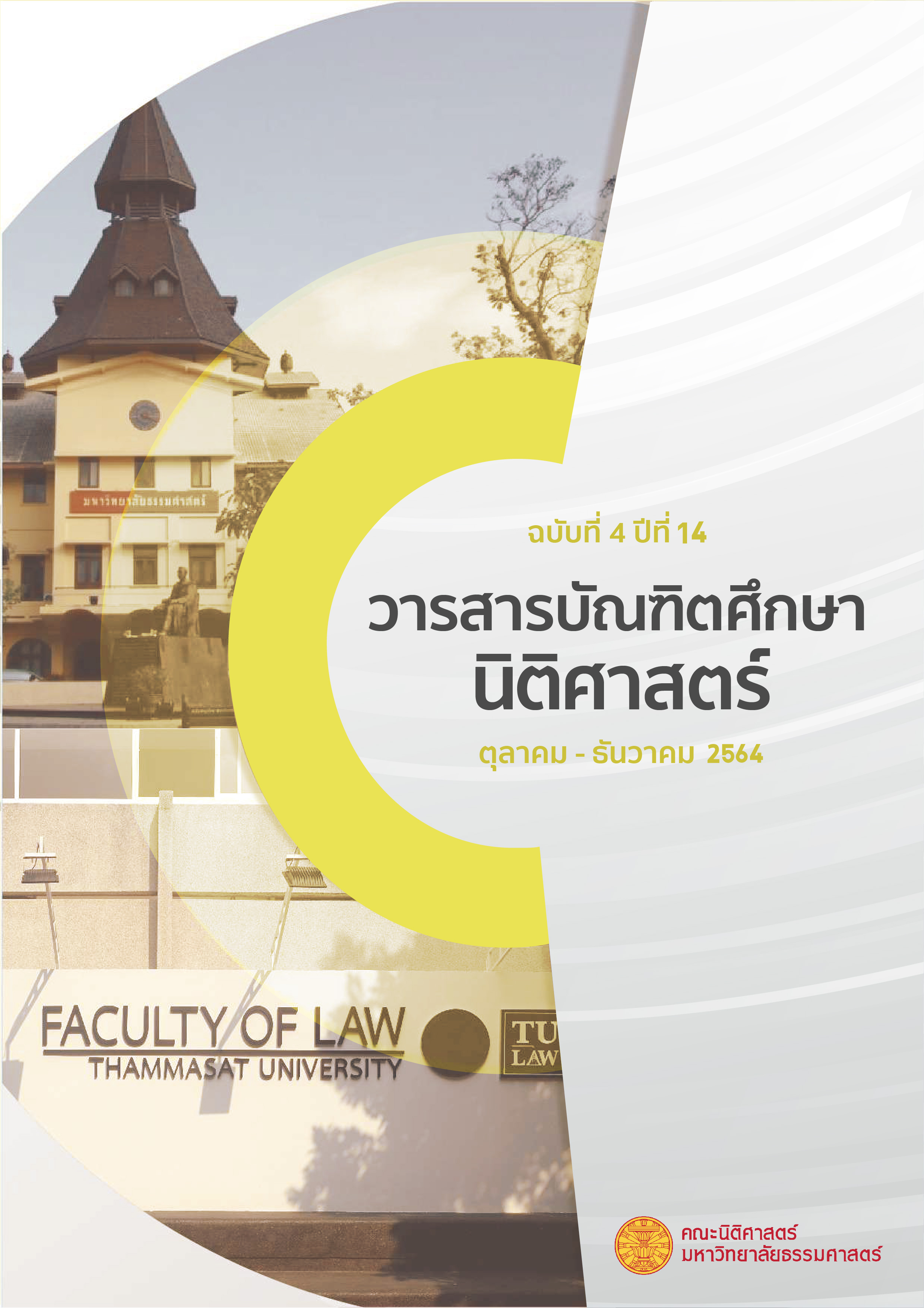ปัญหาการบังคับใช้เขตอำนาจรัฐเหนือพื้นที่ไซเบอร์ : ศึกษากรณีการก่อการร้ายทางไซเบอร์
คำสำคัญ:
Cyberspace, State Jurisdiction, Cyber Terrorismบทคัดย่อ
บทความนี้มุ่งศึกษาปัญหาการบังคับใช้เขตอำนาจรัฐตามกฎหมายระหว่างประเทศเหนือการกระทำผิดที่เกิดขึ้นบนพื้นที่ไซเบอร์ เนื่องจากเป็นพื้นที่ที่มิได้ตั้งอยู่บนเขตแดนทางกายภาพที่แน่นอนจึงทำให้การกระทำผิดที่เกิดขึ้นอาจมีความเชื่อมโยงกับรัฐต่าง ๆ ทั่วโลก ซึ่งทำให้การกระทำผิดเหล่านี้มีลักษณะระหว่างประเทศ อันทำให้การบังคับใช้อำนาจรัฐเหนือการกระทำผิดดังกล่าวต้องเป็นไปตามหลักกฎหมายระหว่างประเทศ อย่างไรก็ตามแนวคิดเกี่ยวกับการบังคับใช้เขตอำนาจรัฐในปัจจุบันยึดโยงกับเขตแดนทางกายภาพ จึงทำให้เกิดปัญหาในการบังคับใช้เขตอำนาจรัฐเหนือพื้นที่ไซเบอร์ ด้วยเหตุนี้ผู้เขียนจึงได้ศึกษาการบังคับใช้เขตอำนาจรัฐตามหลักกฎหมายระหว่างประเทศ เพื่อวิเคราะห์ถึงปัญหาต่าง ๆ ในการปรับใช้กับการกระทำผิดที่เกิดขึ้นบนพื้นที่ไซเบอร์โดยเฉพาะในส่วนของการก่อการร้ายทางไซเบอร์ เนื่องจากถือเป็นภัยคุกคามทางไซเบอร์ที่กระทบต่อเสถียรภาพและความมั่นคงระหว่างประเทศ ซึ่งจากผลการศึกษาจะพบว่าการนำหลักป้องกันมาปรับใช้กับการบังคับใช้เขตอำนาจรัฐเหนือการก่อการร้ายทางไซเบอร์จะช่วยลดความขัดแย้งที่เกิดขึ้นได้อย่างเหมาะสมที่สุด ทั้งนี้ผู้เขียนเสนอให้มีการนิยามการก่อการร้ายทางไซเบอร์ที่ชัดเจนในกฎหมายภายในเพื่อที่จะช่วยส่งเสริมให้รัฐสามารถบังคับใช้อำนาจรัฐเหนือการกระทำผิดดังกล่าวอย่างมีประสิทธิภาพ
เอกสารอ้างอิง
ภาษาไทย
จุมพต สายสุนทร, กฎหมายระหว่างประเทศเล่ม 1 (พิมพ์ครั้งที่ 5, กรุงเทพฯ: วิญญูชน, 2547).
ภาษาต่างประเทศ
Malcolm N. Shaw, International law (Cambridge: Grotius Publications Limited, 1991).
บทความวารสาร
ภาษาต่างประเทศ
Brian K. Houghton & Jonathan M. Schachter, ‘Coordinated Terrorist Attacks: Implications for Local Responders’ (2005) 74 FBI Law enforcement Bulletin 11.
Danielle Ireland-Piper, ‘Extraterritorial Criminal Jurisdiction: Does the long arm of the law undermine the rule of law?’ (2012) 13 Melbourne Journal of International Law 1.
Geoffrey R. Watson, ‘The Passive Personality Principle’ (1993) 28 Texas International Law Journal 1.
Isidoro Blanco Cordero, ‘Universal Jurisdiction’ (2008) 79 International Review of Penal Law 59.
Jan-Peter Ewert and David Weslow, ‘Forum Shopping in Europe and the United States’ (2011) 9 International Trademark Association Bulletin 9.
Kelly A. Gable, ‘Cyber-Apocalypse Now: Securing the Internet against Cyberterrorism and using Universal Jurisdiction as a Deterrent’ (2009) 43 Vanderbilt Journal of Transnational Law 57.
Lee A. Steven, ‘Genocide and the Duty to Extradite or Prosecute: Why the United States is in Breach of Its International Obligations’ (1999) 39 Virginia Journal of International Law 425.
Michael Akehurst, ‘Jurisdiction in International Law’ (1974) 46 British Year Book of International Law Akehurst 145.
Mohammad Iqbal, ‘Defining Cyberterrorism’ (2004) 12 Journal of Computer & Information Law 397.
Oona A Hathaway and others, ‘The Law of Cyber-Attack’ (2012) 4 California Law Review 817.
Pardis Molsemzadeh Tehrani and Nazura Abdul Manap, ‘A rational jurisdiction for cyber terrorism’ (2013) 29 Computer Law & Security Review 689.
Paul N. Stockton & Michele Golabek-Goldman, ‘Prosecuting Cyberterrorists: Applying Traditional Jurisdiction Frameworks to a Modern Threat’ (2014) 25 Stanford Law & Policy Review 211.
วิทยานิพนธ์
เขมชาติ ธีรพงษ์, ‘ปัญหากฎหมายและแนวทางแก้ไขปัญหาอันเกิดจากการประกอบกิจกรรมบนเครือข่ายอิเล็กทรอนิกส์ : ปัญหาการใช้เขตอำนาจรัฐ และปัญหาที่สืบเนื่องมาจากความไม่เพียงพอของกฎหมายที่มีอยู่ในปัจจุบัน’ (วิทยานิพนธ์ นิติศาสตรมหาบัณฑิต มหาวิทยาลัยธรรมศาสตร์ 2543).
รายงานภาษาต่างประเทศ
Gabriel Weimann, ‘Cyberterrorism: How Real Is the Threat?’ (Submitted to United States Institute of Peace, December 2004) 6.
สื่ออิเล็กทรอนิกส์
Dorothy E. Denning, ‘Cyberterrorism’ (Testimony before the Special Oversight Panel on Terrorism Committee on Armed Services U.S. House of Representative, 23 May 2000) <https://faculty. nps.edu/dedennin/publications/Testimony-Cyberterrorism 2000.htm?fbclid=IwAR0fwDSjm35 f2WjzmfMTHaOBxqTsp6vJ9vapr_6E82YQ_MRKP-Bd1KAV3qA> accessed on 26 February 2021.
Mikko Hypponen, ‘Why Antivirus Companies Like Mine Failed to Catch Flame and Stuxnet’ <http:// www.wired.com/2012/06/internet-security-fail/> accessed 12 February 2021.
OpenLearn, ‘Jurisdiction’ (The Open University) <https://www.open.edu/openlearn/ society-politics-law/exploring-the-boundaries-international-law/content-section-4.3.1?fbclid=IwAR0A4d hV-7z03by8SC_8npmLtgtSFHAELmWXRhd4lUAWrCmXIOyc7OmSEIg> accessed 1 March 2021.
Sanjana Sahu, ‘Passive Personality Principle: An Overview’ (Academike) <http://www.lawctopus.com/ academike/passive-personality-principle-overview/> accessed 27 June 2021.
ดาวน์โหลด
เผยแพร่แล้ว
ฉบับ
ประเภทบทความ
สัญญาอนุญาต
บทความหรือข้อความคิดเห็นใด ๆ ที่ปรากฏในวารสารบัณฑิตศึกษานิติศาสตร์เป็นความรับผิดชอบของผู้เขียนบทความโดยเฉพาะ คณะนิติศาสตร์ มหาวิทยาลัยธรรมศาสตร์ และกองบรรณาธิการไม่จำเป็นต้องเห็นด้วย



